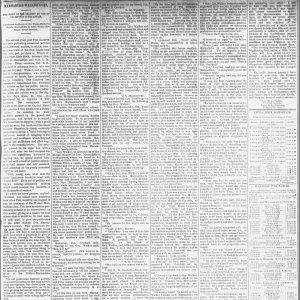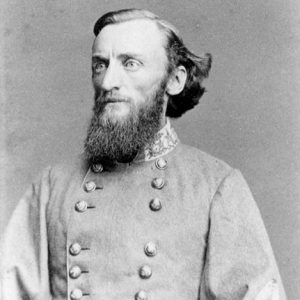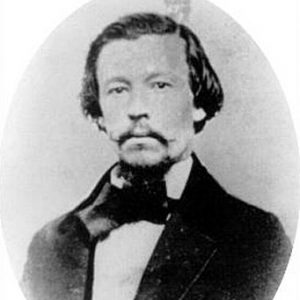calsfoundation@cals.org
Marmaduke-Walker Duel
aka: Walker-Marmaduke Duel
The Marmaduke-Walker Duel was fought during the Civil War between Confederate brigadier generals John Sappington Marmaduke and Lucius Marshall (Marsh) Walker. Marmaduke was originally from Missouri and was the son of a former governor. Walker was originally from Kentucky and nephew of President James K. Polk. Both graduated from the U.S. Military Academy at West Point. They made their way to Arkansas during the war; Marmaduke was stationed there, while Walker was granted a transfer to Arkansas due to trouble with superiors.
Disagreement arose between the two in the summer of 1863 over military actions at Helena (Phillips County) and Little Rock (Pulaski County). Specifically, Marmaduke was unsatisfied with Walker’s behavior in the Battle of Helena, the August 25, 1863, Skirmish at Brownsville and the subsequent Action at Bayou Meto. At Reed’s Bridge, Marmaduke attempted to meet with Walker to discuss the events, but Walker did not want to leave his post. Marmaduke requested removal from Walker’s cavalry and stated that if denied, he would retire from action altogether. General Sterling Price granted the transfer, and when rumors reached Walker about Marmaduke’s questioning of Walker’s courage, Walker began a letter exchange asking for explanation.
The letter carriers were Marmaduke’s friend Captain John C. Moore and Walker’s friend Colonel Robert H. Crockett (grandson of Davy Crockett). In mid-exchange, these men decided to take things into their own hands. Crockett challenged Marmaduke on Walker’s behalf without consulting Walker, and Moore accepted the challenge on behalf of Marmaduke. The men got together to decide the terms of the duel, without the intended participants present, and scheduled the fight. After word reached him, Gen. Price attempted to thwart the fight by ordering each man to stay at his post, but Walker did not receive the order, and Marmaduke ignored it.
On September 6, 1863, Marmaduke and Walker met at the Godfrey LeFevre plantation just seven miles from Little Rock to settle their differences, neither expressing disapproval of the series of letters and subsequent events that had led them there. Moore served as Marmaduke’s second, while Crockett served as Walker’s. Advising friends were Captain William M. Price for Marmaduke and Major John C. King for Walker. Walker brought a surgeon, while Marmaduke brought his party and an ambulance. At fifteen paces, they shot with no results. On the second shot, Marmaduke fatally wounded Walker, immediately rushing to his side to ask if he was harmed. He allowed Walker use of his ambulance, and Walker died the next day in Little Rock.
Marmaduke faced arrest and imprisonment under the 1820 Arkansas law prohibiting duels. After being placed under arrest by Price, he was soon released so as not to create more animosity amongst the troops. Marmaduke arrested Colonel Archibald S. Dobbins, who was loyal to Walker, for not following orders, but Dobbins was released by superiors. Marmaduke never faced charges but felt great remorse for his actions. The following year, he was captured by the enemy and also elevated to major general, the last appointed of this rank in the Confederacy. He went on to be elected governor of Missouri in 1884 and died in 1887.
For additional information:
Christ, Mark K. “‘We Were Badly Whipped’: A Confederate Account of the Battle of Helena, July 4, 1863.” Arkansas Historical Quarterly 69 (Spring 2010): 44–53.
Huff, Leo E. “The Last Duel in Arkansas: The Marmaduke-Walker Duel.” Arkansas Historical Quarterly 23 (Spring 1964): 36–49.
Huntington, Tom. “A Matter of Honor: Dueling.” Civil War Times 44 (June 2005): 14.
LeMasters, Larry. “Only One Man Walked Away.” Civil War Times 41 (October 2002): 48–56.
Sherwood, Diana. “The Code Duello in Arkansas.” Arkansas Historical Quarterly 6 (Summer 1947): 186–197.
Watts, J. Carter. “Confederate Generals’ Dawn Duel.”America’s Civil War 12 (November 1999): 50.
Wood, Larry. “All Barrels Loaded at Fifteen Paces: The Civil War Duel of Confederate Generals Marmaduke and Walker.” Gateway Heritage: The Magazine of the Missouri Historical Society 22 (Winter 2001–2002): 14–19.
M. V. Bowks de la Rosa
University of Maryland

 Duel Story
Duel Story  John Marmaduke
John Marmaduke  Lucius Walker
Lucius Walker 



Comments
No comments on this entry yet.